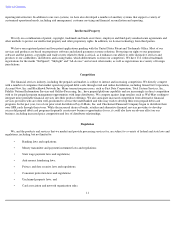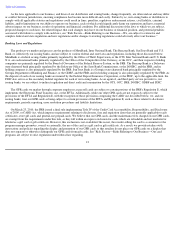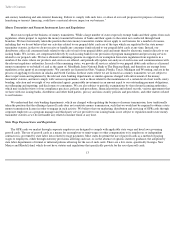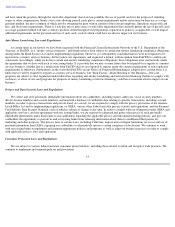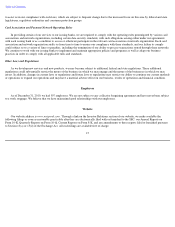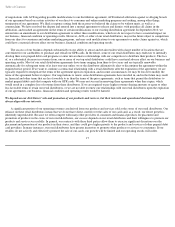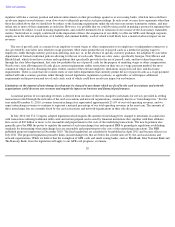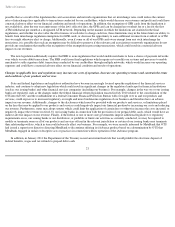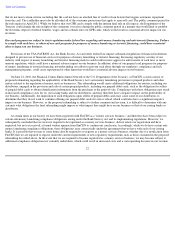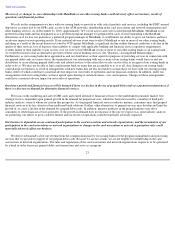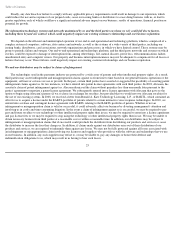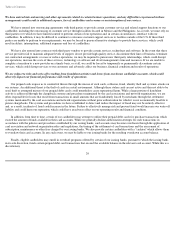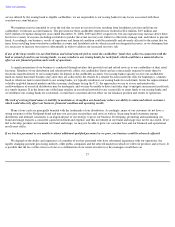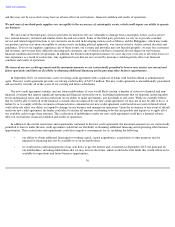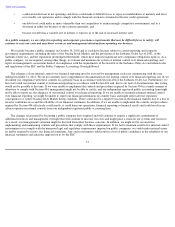NetSpend 2010 Annual Report Download - page 25
Download and view the complete annual report
Please find page 25 of the 2010 NetSpend annual report below. You can navigate through the pages in the report by either clicking on the pages listed below, or by using the keyword search tool below to find specific information within the annual report.
Table of Contents
possible that as a result of the legislation the card associations and network organizations that set interchange rates could reduce the current
rates of interchange fees applicable to transactions conducted by our cardholders, which would decrease our revenues and profit and could have
a material adverse effect on our financial condition and results of operations. In addition, the exemption of GPR cards from the legislation is
not available if, after the one year anniversary of the law's effective date, the GPR card can be charged an overdraft fee or a fee for the first
ATM withdrawal per month at a designated ATM network. Depending on the manner in which the limitations are clarified in the final
regulations, and whether we elect after the effectiveness of such rules to charge such fees, these limitations may in the future limit our ability to
benefit from interchange regulation exemptions for GPR cards, or decrease the opportunity to earn additional revenue from overdraft or ATM
fees we might otherwise elect to charge. Additionally, even if some or all of our GPR cards were exempt from any such interchange fee
restrictions, it is possible that such an exemption may be difficult to preserve if the relevant card associations or network organizations do not
provide any mechanism that enables the recognition of the exemption in processing transactions, which could result in a material adverse
impact on our revenues.
The new legislation additionally requires the FRB to issue regulations that would enable merchants to have a choice of payment networks
over which to route debit transactions. The FRB could issue final regulations which require us to modify our systems and processes to enable
merchants to settle signature debit transactions conducted by our cardholders through multiple networks, which would increase our operating
expenses and could have a material adverse effect on our financial condition and results of operations.
Changes in applicable laws and regulations may increase our costs of operation, decrease our operating revenues and constrain the terms
and conditions of our products and services.
State and federal legislatures and regulatory authorities have become increasingly focused upon the regulation of the financial services
industry, and continue to adopt new legislation which could result in significant changes in the regulatory landscape for financial institutions
(such as our issuing banks) and other financial services companies (including our business). For example, changes in the way we or our issuing
banks are regulated, such as the changes under the federal financial reform legislation enacted in July 2010 related to the consolidation of the
OTS into the OCC and the establishment of a federal Consumer Financial Protection Bureau with oversight over us and our products and
services, could expose us to increased regulatory oversight and more burdensome regulation of our business and therefore have an adverse
impact on our revenue. Additionally, changes to the disclosures which must be provided with our products and services, or limitations placed
on the fees that may be applied to our products and services could negatively impact our financial position by increasing our costs and reducing
our revenue. Furthermore, states may adopt statutes which could limit the application of certain fees or otherwise increase the costs incurred, or
negatively impact the revenue received, by our issuing banks in connection with the provision of our prepaid debit cards, which would have an
indirect adverse impact on our revenue. Finally, if the federal or one or more state governments impose additional legislative or regulatory
requirements on us, our issuing banks or our distributors, or prohibits or limits our activities as currently conducted, we may be required to
modify or terminate some or all of our products and services offered in the relevant jurisdiction or certain of our issuing banks may terminate
their relationship with us, which in turn could adversely affect our business. For example, we were recently informed by MetaBank that OTS
had issued a supervisory directive directing MetaBank to discontinue offering its iAdvance product based on a determination by OTS that
MetaBank engaged in unfair or deceptive acts or practices in connection with its operation of the iAdvance program.
In addition, in January 2011 the Department of the Treasury issued an interim final rule that would prohibit the electronic deposit of
federal benefits, wages and tax refunds to prepaid debit cards
21


